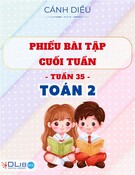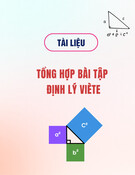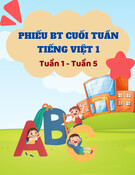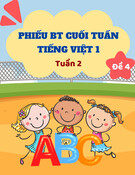
1
TRƯỜNG THCS LƯƠNG THẾ VINH
TỔ: TIẾNG ANH
ĐỀ CƯƠNG ÔN TẬP CUỐI HỌC KỲ I
MÔN: TIẾNG ANH 8
NĂM HỌC :2024-2025
I. USE OF ENGLISH
A.CHOOSE THE WORD WHOSE UNDERLINED PART IS PRONOUNCED DIFFERENTLY
FROM THAT OF THE OTHERS.
1. A. cultural B. documentary C. rice D. ethnic
2. A. pray B. admire C. contestant D. decorative
3. A. community B. custom C. costume D. museum
4. A. children B. choose C. child D. mechanic
5. A. cousin B. interesting C. link D. fond
6. A. chopstick B. chicken C. cheek D. character
7. A. lantern B. important C. money D. thank
B. VOCABULARY
1. Khmer men teach their children how to ______ fish at an early age.
A. milk B. catch C. raise D. herd
2. The elders often pass on their ______ to the young through stories and activities.
A. traditions B. rules C. legends D. music
3. The mountain people in the Central Highlands use natural ______ to build a Rong house.
A. trees B. posts C. leaves D. materials
4. The kids are excited to ______ the Christmas tree with colorful balls and ribbons.
A. provide B. decorate C. organize D. beautify
5. Many minority groups ______ cows and buffaloes for a living.
A. feed B. herd C. raise D. milk
6. In many cultures, a ______ represents youth, beauty, and pleasure.
A. blooming flower B. communal house C. bamboo pole D. decorative item
7. ______ such as kumquat trees, peach blossoms, and apricot flowers are popular at Tet.
A. Blooming flowers B. Vegetables C. Ornamental trees D. Fruit
8. Traditionally, the ______ in a village is a place for villagers to meet or worship.
A. festival B. market C. communal house D. ceremony
9. Every year, the Bulgarians hold the Surva Festival to chase away ______.
A. bad spirits B. festival goers C. martial artists D. lucky money
10. In many Vietnamese villages, people put up a ______ in the yard of the communal house to welcome Tet.
A. fight B. barrier C. bamboo pole D. young rice
11. The bride wore a stunning white dress during the wedding ______.
A. reunion B. gathering C. ceremony D. celebration
12. Festival ______ wore colorful costumes and danced in the streets.
A. goers B. poles C. habits D. people
13. She trained her huskies to pull a ______ across the snow.
A. dogsled B. lifestyle C. store D. tribe
14. During Tet, the Kinh often prepare traditional ______ such as banh chung and boiled chicken to worship

2
their ancestors.
A. decorative items B. food offerings C. spirits D. martial arts
15. The apple ______ was full of ripe fruit ready to be picked.
A. orchard B. canal C. harvest D. pasture
C. PREPOSITIONS
1. They hang decorative items on a bamboo pole to chase ______________ bad luck.
2. We broke _____________ tradition by travelling abroad on the first day of Tet.
3. They often dress _____________ for the Moon God offering ceremony.
4. The festival only lasted for three days; however, they spent nearly a month preparing _____________ it.
5. The Viet or King has the largest number of people, accounting _____________ about 86% of the
population.
6. Sa Pa is famous ______ the terraced fields located in the mountainous area.
7. In Japan, take ________ your shoes at the entrance to all homes, and most businesses and hotels.
8. My mother is _______ the habit of preparing breakfast every morning.
D. CONVERSATION
1. - Tuan: “You should avoid negative topics like deaths or funerals during Tet.” - Ann: “______”
A. Sure. I'll say that. B. I'll remember that. C. It doesn't matter. D. That would be nice.
2. - Mom: “Don't play with chopsticks when you are at a meal table.” - Son: “______”
A. OK, I won't. B. I'm afraid I can't. C. That's a good idea. D. Sure. I'll do it.
3. - Mark: “What a lovely garden you have!” - Lacy: “______”
A. I'm glad you like it. B. Sure, go ahead. C. I'd love to. Thanks.D. That's a great idea.
4. - Rudy: “Can I borrow your notes from yesterday's class?” - Vivian: “______.”
A. Certainly. B. I think so. C. Yes, you can. D. That's true.
5. Sam: “Could you help me move next weekend?”
Tony: “______. What time should I come over?”
A. Sure, go ahead. B. Of course. C. I'm afraid not. D. Great idea.
6. - Mike: Hello, I’m from Australia. Can I ask you something about the ethnic groups of Viet Nam?
- Nick: “_______”
A. Good B. Really C. Sure D. Thanks.
7. - Duong: We have a tradition of not dumping rubbish during the first 3 days of Tet.
- Whisper: _________.
A. You must be kidding! B. Spot on.
C. I’m serious. D. Sound lovely!
8. - Vinh: “I don’t think I can do this” Liam: ____________________
A. Oh, come on. Give it a try B. Yeah, it’s not easy
B. No, I hope not D. Sure, no way!
9. - Bob: “Look at this dish. It has five colours.” - Lily: “______________”
A. How nice! B. Yes. That’s alright. C. You’re welcome. D. Sounds bad.
10. - “How often do you take part in Huong pagoda festival?” – “_____________”
A. In the early morning. B. It’s very far.
C. I like going to the pagoda. D. Once a year.
E. VERBS OF LIKING/ DISLIKING

3
1. Does she fancy ______ a book to the younger children?
A. read B. reading C. to read D. B&C are correct
2. They love _______ out with their friends.
A. eating B. to eat C. eat D. A&B are correct
3. John was keen on ______ cartoons.
A. watching B. to watch C. watch D. watched
4. Our kids are _______ in playing with pets when they have free time.
A. interested B. fond C. crazy D. keen
5. My son didn’t _____ playing football when he was young.
A. crazy about B. liked C. fond of D. adore
F. CONJUNCTIONS
1. Lan wants to join the school music club, _______ she can’t sing or play any instruments.
A. but B. however C. so D. therefore
2. You can go to the city centre by bus ______ you can go there by train.
A. because B. or C. and D. yet
3. Fred came to school late, he overslept.
A. for B. or C. and D. but
4. Laura has to finish her homework; ________, she can’t go out with her friends.
A. but B. however C. therefore D. otherwise
5. It was raining heavily; ________, he continued planting trees in the garden.
A. therefore B. however C. but D. or
G. QUESTIONS
1. ________ do you play tennis? – For excercise.
A. Which B. Who C. Why D. How
2. ________ can I buy some milk? – At the supermarket.
A. Which B. Who C. Where D. How
3. ________ much do you weigh?
A. Which B. Who C. What D. How
4. ________ hat is this? – It’s my brother’s.
A. Which B. Whose C. What D. How
5. ________ do the ethnic children walk from their village to the town? – Everyday.
A. Which B. Who C. Where D. How often
6. How ________ you get here? – I came here by train.
A. do B. did C. wiere D. are
7. What ________ you do during the trip to the countryside this weekend?
A. do B. did C. were D. will
8. How many ethnic groups ________ there in Vietnam?
A. do B. are C. was D. is
9. How ________ they celebrate Lim festival?
A. do B. are C. were D. does
10. Why ________ she collecting photos of flowers on the Internet? – Just for fun.
A. does B. are C. was D. is

4
11. __________________ stilt houses stand on wood, bamboo, and __________________?
A. Do-leaf B. Does - leaves C. Does – leaf D. Do – leaves
12. __________________ your grandmother like folk __________________?
A. Do-music B. Do-musics C. Does – music D. Is – music
13. Do Vietnamese __________________ often eat moon cakes at the Mid-Autumn Festival?
A. person B. people C. persons D. peoples
14. _____________ communal house the largest and tallest house in the village?
A. Do B. Does C. Is D. Are
15. _____________ the Khmer mostly earn their living from weaving?
A. Do B. Does C. Are D. Is
H. ARTICLES
1. Thank you. That was ______ very nice lunch.
A. a B. an C. x D. the
2. Mark Twain, _____ American writer, wrote “Life in the Mississippi River”.
A. an B. a C. the D. x
3. _____ youngest boy has just started going to _____ school.
A. a - x B. x - the C. an – x D. the – x
4. Please turn off ______ lights when you leave ______ room.
A. the – the B. a – a C. a – the D. the - a
5. ______ Netherlands has a long coastline with beautiful beaches.
A. A B. An C. X D. The
I. COUNTABLE AND UNCOUNTABLE NOUNS
1. My mother puts some milk and two ______ in my schoolbag.
A. orange juice B. jam C. apples D. sugar
2. How much ______ is there in the bottle?
A. bananas B. bread C. water D. beans
3. We are going to cook Vietnamese food including ______ and ______.
A. fried rices / beef noodle soup B. fried rice / beef noodle soups
C. fried rice/ beef noodle soup D. fried rices / beef noodle soups
4. How ______ times a day do you brush your ______?
A. many- tooth B. many – teeth C. much – teeth D. much – tooths
5. How ______ ethnic groups in Viet Nam do you know?
A. much B. often C. many D. tall
J. ERROR
1. We don’t need too much sugars. There’s still a packet in the cupboard.
2. My son started to play the baseball when he was ten.
3. According for tradition, the first person to enter the house on New Year’s Eve brings either good luck or
bad luck.
4. At weekends my friend and I often go fishing and spending time at the park if it is fine.
5. Kim will definitely tells you all about her trip to Europe when she gets back.

5
K. Verb tenses
1. The teacher _______ furious if you don’t do the homework.
A. will be
B.is
C. don’t be
D. won’t be
2. What _________at school tomorrow?
A. were you doing
B. will you do
C. are you doing
D. you doing
3. My mum ________ to her hometown next week.
A. didn’t return
B doesn’t return
C. won’t return
D. returned
4. If you learn English carefully, you ________the modern culture in the world.
A. can approach
B. will approach
C. approached
D. would approach
5. If you eat too quickly, you _________ pay attention to whether your hunger is satisfied.
A. will not
B. didn’t
C. don’t
D. couldn’t
6. When in Japan, you should avoid_________on the go.
A. eating
B.eat
C. to eat
D. eats
7. He started___________ the net hours ago. Let’s tell him to stop to surf.
A. surf
B. to surf
C. surfs
D. surfing
8. Fishermen should avoid________ to the sea today because of the coming storm.
A. go
B.to go
C. going
D. goes
II. READING
A. Read and CIRCLE the item among A, B, C or D that best answers about the passage
The lifestyle in Bangkok is quite different. I think that living in Bangkok is very exciting. I haven’t lived
here all my life. My family came here when I was three. But now it is my home. Nearly all my friends live
here. It is our capital city, and very big. From morning till night there are crowds of people on the main
streets. Some parts of the city are very noisy. I have a long journey to school every day, but I don’t mind
because it is so interesting. There’s always something happening in the streets. There are all kinds of people
selling things – fruits, flowers, cooked food, clothes - everything you could imagine. I really enjoy the
excitement of the crowded streets and large modern buildings. I love walking around the streets at the
weekend with some other boys from my class.
1. When did the writer move to Bangkok?
A. When he was three months old B. At the age of three
C. When he was in grade three D. At the age of thirteen
2. What does the word “main” in the paragraph mean?
A. quiet B. minor C. major D. clean
3. Why doesn’t the writer mind the long journey to his school?
A. Because he travels by bus
B. Because he can see many interesting things in the streets
C. Because he selling fruits
D. Because he can enjoy cooked food
4. Which of the following sentences is NOT true?
A. The writer was born in Bangkok B. Bangkok is the capital city of Thailand
C. The writer’s house is very far from his school D. Almost streets in Bangkok are crowded and busy
5. Who does the writer walk around the streets at weekends with?
A. His sister B. His brother C. His cousin D. His classmates
B. Read and CIRCLE the item among A, B, C or D that best answers about the passage
The country is more beautiful than a town and more pleasant to live in. Many people think so, and go to
the country for the summer holidays though they cannot live there all the year round. Some have a cottage
built in a village so that they can go there whenever they can find the time. English villages are not all alike,



![Tài liệu tham khảo Tiếng Anh lớp 8 [mới nhất/hay nhất/chuẩn nhất]](https://cdn.tailieu.vn/images/document/thumbnail/2025/20250806/anhvan.knndl.htc@gmail.com/135x160/54311754535084.jpg)










![Phiếu bài tập cuối tuần Tiếng Việt 1 tuần 2 đề 2: [Hướng dẫn chi tiết]](https://cdn.tailieu.vn/images/document/thumbnail/2025/20250728/thanhha01/135x160/42951755577464.jpg)

